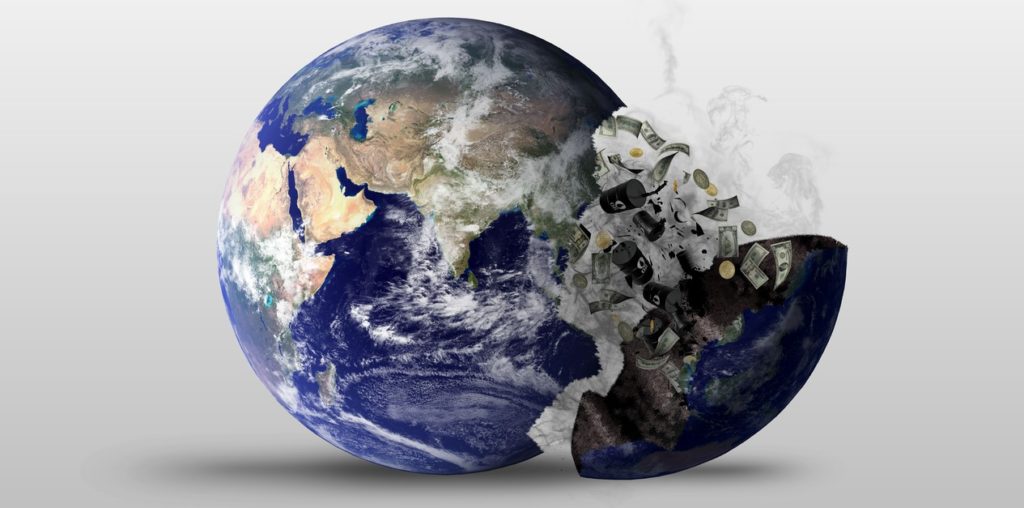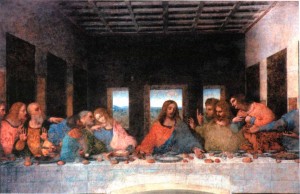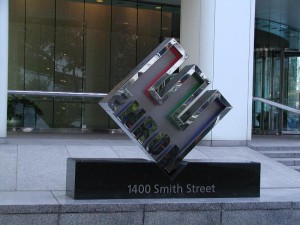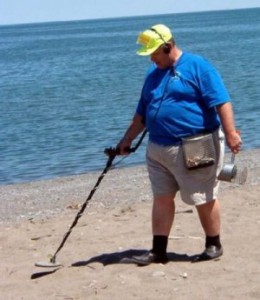
How Can God Exist When Our World Is So Broken?
How can God exist when our world is so broken?
Our world is far from perfect. In fact, it is quite broken. The world is full of suffering and injustice, and God seemingly has done nothing to stop it. Isn’t the reality of our cruel and unjust world incompatible with the idea of a good and powerful God? After all, if God knows everything, surely he would have known beforehand how broken the world would be that he would create. God either is not great or he is not good. For if he were good and if he could, he would have made a much better world – one far less broken. As Sam Harris has said: “If God exists, either He can do nothing to stop the most egregious calamities, or He does not care to. God, therefore, is either impotent or evil.”
Not only is the world broken, but the religious concept of “Heaven” is broken – especially as presented in the Bible. We are all the products of our own environment, and all have various degrees of exposure to different philosophies and religions, and if God would rig the system so that there could be only one way to heaven – through Jesus – he would be a very “unjust” God indeed. If that’s who “God” is, I’ll pass.”
This argument carries great emotional weight, but at the same time provokes a series of questions surrounding what we mean by “broken” and the alternatives of the reality in which we find ourselves. The simple truth is this: the fact that we recognize the world is “broken” is evidence for God, rather than an argument against his existence.
1. What do we mean by a “broken” world?
Where did we get the idea the world is broken? What do we mean by “broken”? We all seem to have this internal sense that there is something wrong with the world. But when we admit the world is “broken”, we are appealing to a standard of “unbrokenness” – an image of an ideal world. But where does such a standard come from in a world without God? Likewise, when we say the world is “unjust”, we are appealing to a standard of “justice”. But where do we get the idea that things should be “just”?
C.S. Lewis, as you know, was an atheist before becoming a Christian. He concludes in Mere Christianity that atheism turns out to be too simple. He writes:
“My argument against God was that the universe seemed so cruel and unjust. But how had I got this idea of just and unjust? A man does not call a line crooked unless he has some idea of a straight line. Thus in the very act of trying to prove that God did not exist—in other words, that the whole of reality was senseless—I found I was forced to assume that one part of reality—namely my idea of justice—was full of sense. Consequently atheism turns out to be too simple. If the whole universe has no meaning, we should never have found out that it has no meaning: just as, if there were no light in the universe and therefore no creatures with eyes, we should never know it was dark. Dark would be a word without meaning.”
In addition, where did we get the idea God was supposed to be just? Throughout most of human history, civilizations believed the “gods” were the cause of the injustice in the world. What was behind every great calamity? The capricious actions of the gods. Yet today, especially in the West, we doubt God because of injustice in the world. Andy Stanley points out that when we reject God because of injustice in the world, we don’t solve injustice; we lose the definition altogether. In fact, the best way to get rid of injustice in the world is to get rid of God. But when we do, what we’re left with when we have no standard of justice is:
Your Justice | My Justice | Nazi Justice | Klan Justice | Street Justice | Majority Justice | Nature’s Justice | Rich Justice | Power Justice
2. If there is no God, does evil exist?
Is there actually such a thing as “evil”? If the answer is “no”, and all we are is biology or molecules in motion, then there really is no “brokenness” in the world – as everything simply is the way it is. After all, what is the basis for calling anything evil in a world which sprung into existence from nothing through a process of evolution by natural selection? In such a world, there are no moral absolutes. We, therefore, have no inherent right to condemn others, and ultimately, have no actual “free will” of our own – as we are simply the products of our biological makeup and surroundings. In a world without God, we might find certain things tasteful or distasteful, but we cannot say that anything is inherently morally right or wrong, good or evil.
Atheist Steven Pinker states:
“The scientific outlook has taught us that some parts of our subjective experience are products of our biological makeup and have no objective counterpart in the world. The qualitative difference between red and green, the tastiness of fruit and foulness of carrion, the scariness of heights and prettiness of flowers are design features of our common nervous system, and if our species had evolved in a different ecosystem or if we were missing a few genes, our reactions could go the other way. Now, if the distinction between right and wrong is also a product of brain wiring, why should we believe it is any more real than the distinction between red and green? And if it is just a collective hallucination, how could we argue that evils like genocide and slavery are wrong for everyone, rather than just distasteful to us?”
Most of us, however, would say “yes”, evil does exist – some things are always wrong. Torturing and killing innocent people for fun, for example, is always wrong in every culture at all times. But if there are things that are always wrong, who decides?
3. Who decides what is right or wrong?
Some might say “Society” determines what is right or wrong. But what is a society? Society is a collection of humans. So, which collection of humans are going to determine for us right from wrong? Who are these angels, as Milton Friedman says, who we find to properly govern society for us? And which society are we talking about – Mother Theresa’s or Hitlers? Do we have a right to condemn the Nazi’s for following the laws of their own society? Were we wrong during the Nuremberg Trials for imposing our laws on members of their society? We seem to be left with a choice that either there is a moral standard that transcends society or there is no moral standard. And if there is no moral standard, the Nazis were not wrong, and we are back to saying there is no actual evil since we are simply evolved biology and, thus, there is no “brokenness”.
Others might say “Evolution” determines what is right or wrong. For example, we might say humans learned to cooperate in order to survive and thrive; therefore, cooperation is right because we evolved that way. But obviously not everyone cooperates with others. In fact, there are many in every society who have thrived precisely because they did not cooperate with others – gaining at someone else’s expense.
Are some of us, then, just “less evolved”? If yes, who decides who is “more evolved”? Society? Which one? And if some of us are “more evolved”, in our sense of morality for example, are we saying we should hold others to our same “standard”? (Who could blame someone for simply being less evolved?) And if we have evolved, are we saying that evolutionary “genetic mutations” over millions of years have the moral authority to tell you how you “ought” to behave? Without a moral standard, words like “should” and “ought” are without meaning.
If evolution determines what is right and wrong, are we saying physical “survival” is the highest moral virtue? What about sacrificing yourself for others, for example, as many in our military have done? Where would that fall on the evolutionary scale of right and wrong? Some may argue that we sometimes find examples of sacrifice in nature – kamikaze bees, for example, protecting the hive. But there is an important difference between descriptive and prescriptive behaviors. Natasha Crane points out the distinctiveness of a moral obligation:
“Dolphins are known for random acts of kindness. They’ve saved swimmers from sharks and have even guided stranded whales back to sea. But morality, as humans intuitively understand it, is not merely a description of what is good or bad. It is also a prescription for what we should or shouldn’t do. We don’t just say that murder is bad, for example; we say we shouldn’t do it. There’s a moral obligation attached. If we apply this same understanding to the animal world, we would have to say that dolphins should be kind to others. But no one applies moral obligations to animals. We see their actions as facts of their existence, not something appropriate for moral judgment (is there ever moral outrage when animals kill each other – or, for that matter, when animals do anything?) Even if evolutionary theory accurately explained how certain behaviors evolved to aid survival, it wouldn’t explain the jump to our human sense of moral obligation.”
If we are saying our evolved sense of right and wrong is based on humans being able to survive and thrive, wouldn’t improving the gene pool for the benefit of all humanity be one way for humans to better survive and thrive? For example, is there anything inherently wrong with killing the weak and “undesirables” among us, like Hitler did, to ultimately produce healthier and happier humans? Based on this rationale, atheist Peter Singer has argued the case for selective infanticide.
“When the death of a disabled infant will lead to the birth of another infant with better prospects of a happy life the total amount of happiness will be greater if the disabled infant is killed. The loss of a happy life for the first infant is outweighed by the gain of a happier life for the second.”
If there is no God, and we evolved from nothing, it is hard to argue against the rationale that some humans are simply better than others. After all, in a world where organisms fight for survival and the fittest win, wouldn’t it be more consistent to say that humans are very unequal? Stronger or weaker physically, intellectually, emotionally, and in many other ways? Yet, at the same time, we all fight vociferously for things like “equal rights”.
4. What do we mean by “equal rights”?
Without God, what do phrases like “equal rights” mean, and why do we fight so hard for them? The Declaration of Independence stated, “We hold these truths to be self-evident, that all men are created equal.” But human equality is not self-evident at all. Israeli historian Yuval Noah Harari writes:
“The Americans got the idea of equality from Christianity, which argues that every person has a divinely created soul, and that all souls are equal before God. However, if we do not believe in the Christian myths about God, creation and souls, what does it mean that all people are “equal”?
The first chapter of the Bible claims that God made human beings in his image. If this is not true, then there is no basis for equality and rights. Writing from an atheistic standpoint, Harari goes on to explain that: “Homo Sapiens have no natural rights, just as spiders, hyenas, and chimpanzees have no natural rights.”
In her book, The Secular Creed, Rebecca McLaughlin writes:
“We must not be naïve about the past. The painful reality is that the founding fathers excluded enslaved Africans from their vision of human equality. But this problem isn’t fixed by erasing the basis for equality. In fact, the dehumanizing ways in which black people were treated by white slaveholders were only truly wrong if human beings are truly more than animals, if love across racial difference is right, and if right and wrong are universal. The rational atheist can cling to none of these things.”
McLaughlin goes on to point out that while our basic moral beliefs about human equality came to us from Christianity, they have been deliberately rebranded as secular, to a large degree beginning shortly after World War II, in order to have greater appeal to more countries around the world. She states:
“This rebranding has worked so well that even atheists now hold some Christian beliefs to be self-evident truths. The belief that every human life is valuable, that the oppressed and marginalized deserve justice, that we should love those whose race or culture or country is different from ours, that we should even love our enemies – these beliefs all come to us from a first-century Jewish rabbi who died on a cross and whose resurrection spawned the greatest movement for diversity in history. Without Christianity, belief in human rights, in racial equality, and in the responsibility of the powerful toward the victimized becomes blind faith.”
Like the man who borrows your stick so he can then beat you with it, atheists tend to unconsciously borrow from a Christian ethic to build their case against God. We forget that terms such as human equality and equal rights are not at all self-evident. Yet, we today in the West live each day under the warm blanket of freedom and equality. But this is a blanket we all take for granted. Our belief in equal rights have become so foundational, so intrinsic, that we are mostly unaware of how deeply it has been shaped by a Christian ethic unknown to most of human history. Andy Stanley points out that “we are least aware of things that are most constant”. We neglect to recognize just how much we view our “broken” world through the lens of presupposed moral principles such as justice and equality.
In his book 12 Rules for Life, Jordan Peterson writes:
“Christianity achieved the well-nigh impossible. The Christian doctrine elevated the individual soul, placing slave and master and commoner and nobleman alike on the same metaphysical footing, rendering them equal before God and the law… the implicit transcendent worth of each and every soul established itself against impossible odds… Christianity made explicit the surprising claim that even the lowliest person had rights, genuine rights – and that sovereign and state were morally charged, at a fundamental level, to recognize those rights.
We forget that the opposite was self-evident throughout most of human history. We think that it is the desire to enslave and dominate that requires explanation. We have it backwards, yet again… The society produced by Christianity was far less barbaric than the pagan – even the Roman – ones it replaced… It objected to infanticide, to prostitution, and to the principal that might means right. It insisted that women were as valuable as men… It demanded that even a society’s enemies be regarded as human… All of this was asking the impossible: but it happened.”
You might say, but what about the terrible morals described in the Bible? Well first, which part of the “Bible” are we talking about? The Bible was written by 40 authors over roughly 1,500 years. In the first century, the rapid growth of the early Christian church occurred before there was “the Bible”. The foundation of Christianity is not the Bible. It is an event – the Resurrection. When all the letters and writings (books) were compiled several hundred years later, it included the Jewish Scriptures (Old Testament) largely because it pointed to Christ (e.g., the prophecies throughout, such as Isaiah 53 and Daniel 9). The Jewish Scriptures tell the story of God’s covenant with ancient Israel during a specific season of Jewish history. Ultimately, Christ was the fulfillment of that covenant. Through Christ, there is a new covenant. The old and new “covenants” are how we get the terms old and new “testaments”.
So, are we talking about the morals of the Jewish Scriptures? Our pastor, Willy Rice, points out, the Jewish Scriptures are mostly “descriptive” as opposed to “prescriptive”, telling the story of very imperfect people, even highlighting their flaws. Obviously much of it may appear “distasteful” to us in the 21st century, looking back on a very primitive period in history. But as we’ve discussed, we’re looking through a very different lens today – one built on a Christian ethic that did not exist in the ancient world.
You might say, but multitudes through the ages have committed horrendous atrocities in the name of “God” – but as Frank Turek reminds us, we don’t judge a philosophy or religion by its abuses.
You can choose to reject God because you disagree with its morals, but that wouldn’t exempt you from the need to embrace an alternative systematic worldview – one that is both consistent and comprehensive. As we know, a fatal flaw in reasoning would be if we were to build our own moralistic edifice of “God” and then want to compare that self-made version to the God of the Bible as a means of disproving him. And in so doing, you are likely borrowing from the Christian ethic to make your case. If we reject God because he does not align with our beliefs, we are still left needing to clarify those beliefs and answer several foundational questions. Willy Rice poses four key questions we must consider when formulating our worldview:
- Why is there something rather than nothing?
- What has gone wrong?
- Is there any hope?
- How does it all end?
You might say, but even if Christianity has shaped our morals today, doesn’t science still offer a better explanation for how we got here?
5. What are the alternatives for how we got here?
Can science answer the question of the origin of the universe? In his book, The God Delusion, Richard Dawkins, provides his scientific argument for why there is no God. In the middle of the book, Dawkins summarizes what he calls the “central argument” of his book at the end of his chapter titled Why There Almost Certainly Is No God. Dawkins summarizes his concluding point regarding the origin of the universe by stating: “we should not give up hope”. Dawkins writes:
“This chapter has contained the central argument of my book, and so, at the risk of sounding repetitive, I shall summarize it as a series of six numbered points.
1. One of the greatest challenges to the human intellect, over the centuries, has been to explain how the complex, improbable appearance of design in the universe arises.
2. The natural temptation is to attribute the appearance of design to actual design itself…
3. The temptation is a false one, because the designer hypothesis immediately raises the larger problem of who designed the designer…
4. The most ingenious and powerful [explanation] so far discovered is Darwinian evolution by natural selection…
5. We don’t yet have an equivalent [explanation] for physics…
6. We should not give up hope of a better [explanation] arising in physics, something as powerful as Darwinism is for biology…
“If the argument of this chapter is accepted, the factual premise of religion – The God Hypothesis – is untenable. God almost certainly does not exist.”
From what would appear to be a very scientific book, Dawkins seems to be concluding the following: God almost certainly does not exist. Why? Because “we should not give up hope” of one day finding a better explanation for the design and existence of the universe. “Hope” does not sound like a very scientific answer, aside from the obvious non sequitur in his argument.
Many atheists state something very similar to Dawkins’ argument: “We have to give science more time. If we give science more time, one day we will find a natural cause for the universe.”
Obviously, this statement requires a lot of faith in science. But beyond that, it is a logical fallacy. Since we know from science that space, time, and matter had a beginning, we know that the cause cannot be made of space, time, or matter. The cause must be beyond those things. You might say why couldn’t the universe, or DNA, just “be” or “always was”? But we know from science the universe had a beginning (e.g., Edwin Hubble and the Hubble telescope in the 1920s, the Second Law of Thermodynamics, etc.)
Science cannot in principle find a natural cause for all of nature because if nature had a beginning, the cause cannot be something natural – because nature didn’t exist. Nature was the effect, so it cannot also be the cause. The cause must be something beyond nature, or supernatural. This is what Christians mean by “God” – something that is spaceless, timeless, and immaterial – beyond nature. You might say, “we are all atheists about most gods; some of us just go one god further. I don’t believe in the Christian God just like a don’t believe in the Sun god or leprechauns or unicorns.” But there is an obvious difference between something with physical or time-bound limitations and a spaceless, timeless, immaterial, and powerful Creator – an uncaused cause.
Scientists take issue with “God of the Gaps” responses to scientific questions – meaning, for what cannot be explained, “God” fills in the gaps. Critics of faith argue that it is intellectually lazy to say the answer to the origins of the universe must be “God”. They argue that throughout history, gods have been disproven through scientific advancement – few people still believe in the gods of mythology or of ancient Greece or Rome, for example – and eventually all gods will be disproven by science. Civilizations throughout history believed in many gods – Zeus, Thor, Jupiter, Mars, and a myriad of different gods that control different events and aspects of our lives – and that we were at the whim of their control. The world was unstable and unpredictable because it was unexplainable.
In Genesis chapter 1, what happened after God created the universe? God Rested. Meaning he stopped creating. He had already put into motion the laws of science. If that is true, what would we expect to discover? A universe that is stable, predictable, and explainable – a universe that could be consistently observed through science. Which is why it was believers in God who launched the modern scientific revolution. John Lennox states:
“Newton, Copernicus, Kepler, Galileo: All believed in a God who created and sustained the universe. Instead of the founders of modern science being hindered by their belief in God, their belief in God was the motor that drove their science.”
Lennox also points out that the scientist’s confidence in reason ultimately depends on the existence of a rational and purposeful Creator. Otherwise, our thoughts are nothing more than electro-chemical events, the chattering of soul-less synapses. Lennox states:
“If you take the atheistic, naturalistic, materialistic view, you’re going to invalidate the reasoning process, because in the end you’re going to say that the brain is simply the end product of a blind, unguided process. If that’s the case, why should you trust it?”
6. What is “Choice” without the ability to Choose?
What were God’s options in creating the world? Create humanity with “free will”, or create a world of robots, where we had no choice but to choose God and love God. But if we had no choice, it really wouldn’t be love; words like “choice” and “love” would be without meeting. We would have no ability to truly love. Love necessitates choice.
When we turn back to Dawkins’ world, however, we find a lack of choice, a lack of free will, naturalistic determinism. If all we are is biology, we are incapable of stepping outside of our natural selves to choose freely. If that is the case, what we may perceive as choices are actually the summation of our chemical makeup and conditioning – and we really have no choice in the matter. Many atheists do not hesitate to acknowledge the non-existence of free will:
Evolutionary biologist Jerry Coyne: “To assert that we can freely choose among alternatives is to claim, then, that we can somehow step outside the physical structure of our brain and change its workings. That is impossible. Like the output of a programmed computer, only once choice is ever physically possible: the one you made.”
Plant biologist Anthony Cashmore: “The reality is, not only do we have no more free will than a fly or a bacterium, in actuality we have no more free will than a bowl of sugar. The laws of nature are uniform throughout, and these laws do not accommodate the concept of free will.”
Molecular biologist Francis Crick: “‘You’, your joys and your sorrows, your memories and your ambitions, your sense of personal identity and free will, are in fact no more than the behavior of a vast assembly of nerve cells and their associated molecules.”
Cornell historian of biology William Provine: “It starts by giving up an active deity, then it gives up the hope that there is any life after death. When you give those two up, the rest of it follows fairly easily. You give up the hope that there is an imminent morality. And finally, there’s no human free will. If you believe in evolution, you can’t hope for there being any free will. There’s no hope whatsoever in there being any deep meaning in life.”
In a purely material world, scientists tell us that free will is an illusion – and the “decisions” we make are the only ones we could have made, given our biological brain wiring.
For love to exist, choice must exist. For choice to exist, there must be contrasting alternatives – a spectrum of good and evil, holiness and wickedness, perfection and brokenness. Without choice, there is no brokenness. With choice, brokenness is necessary. And we clearly see in our world the repercussions of the choices we make. A world under the regimes of Hitler and Lenin and Stalin and Mao Zedong – all just in the 20th century – is a very broken world indeed. As is a world where humans use “God” or religion as a means to justify their own evil ambitions (but as we’ve said, we don’t judge a religion by its abuses).
But it gets worse. Beyond the obvious evils in the world, we all fall short. If the golden rule is our guide to how we ought to live, we all ‘miss the mark’. I have to admit that I’m a contributor to the world’s brokenness. Have I ever stolen something or hurt someone? Have I ever been rude, short-tempered, or acted selfishly? Of course. I’m part of the problem. We all are.
Summary
Here is a quick recap of the prior 6 sections:
- When we say the world is “broken” we are appealing to a standard of perfection by which we compare what we call broken. But in a world without God, where do we find such a standard ? Where do we get the idea of justice? For when we reject God because of injustice in the world, we don’t solve injustice; we lose the definition altogether.
- Most of us would admit that evil exists – meaning that there are some things are always wrong. But who decides?
- If Society determines what’s right and wrong, we have to decide which society (which collection of humans) we are talking about. If Evolution determines what’s right and wrong, we find a lack of consistency – some of us cooperate, others do not – and if some humans are simply less evolved, can we blame them? And ultimately, are we saying that evolutionary “genetic mutations” have the moral authority to tell you how you “ought” to behave?
- The concept of equal rights was not self-evident throughout most of human history. The idea that all humans have worth and inherent rights came from the belief in a Creator.
- Science cannot provide a natural explanation for the origins of the universe. Conversely, it was the belief in a Creator (who created a stable, predictable, and explainable universe) that drove the modern scientific revolution.
- For us to actually have a choice, “free will” must exist; thus, brokenness is a natural consequence.
Suffering
You might say, our world may be broken because of human choices, but it is also broken because of the immense suffering caused by the natural world – such as sickness and natural disasters. Why would God allow so much suffering? But who are we to commandeer someone else’s suffering to make our case against God? For many, suffering is what leads them to God, not away from him. As Andy Stanley points out, doubting God because of suffering in the world is primarily a “first-world” issue. In many third-world countries, you would expect to find next to extraordinary poverty overwhelming doubt, but what you often find instead is extraordinary faith.
Jordan Peterson, as a psychologist, points to the reality of suffering as the cornerstone for how we can know anything is true:
“What can I not doubt? The reality of suffering. It brooks no argument. Nihilists cannot undermine it with skepticism. Totalitarians cannot banish it. Cynics cannot escape from its reality. Suffering is real, and the artful infliction of suffering on another, for its own sake, is wrong. That became the cornerstone of my belief.”
Heaven: The Great Equalizer
With every great tragedy and devastating disaster, people have concluded: “How can there be a God to allow this to happen?” Perhaps the appropriate conclusion in response is: “How can there not be a Heaven?” Nothing is fair in this broken world; Heaven is the great equalizer. For every aborted baby, deserted mother, abused child, and disease-stricken body – for every impoverished society and imprisoned saint – for every death, hurt and heartache – there is the offer of Heaven. There is eternal redemption and reward. The only way this broken world can make sense is with the backdrop of the next.
Our Ability to Choose
You might say, but why wouldn’t a perfectly loving and good God make the fact of his existence undeniable? There are things we may never understand this side of eternity, but as we’ve said before, “choice” must exist for us to truly love God. As Natasha Crain points out:
“Some amount of free will is necessary for us to genuinely love God… If God revealed himself completely, he would effectively be removing our freedom to seek and love him.”
Similarly, in the 1600’s, Blaise Pascal wrote:
“Willing to appear openly to those who seek him with all their heart, and to be hidden from those who flee from him with all their heart, God so regulates the knowledge of himself that he has given indications of himself, which are visible to those who seek him and not to those who do not seek him. There is enough light for those to see who only desire to see, and enough obscurity for those who have a contrary disposition.”
You might ask, but what about those who have never heard the message of Christianity? C.S. Lewis points out that while the Bible says no one can get to heaven except through Christ, the Bible does not say that only those who know him can be saved through him. The fact is that God has not informed us of his plans for dealing with the uninformed – those in distant and isolated lands, those perhaps too young, or those with various capacities for understanding. However, what would not make sense is for us to remain outside the “deal” just because we don’t know what the deal might be for someone else. In fact, it would be quite arrogant of us to believe we could place ourselves in the lives and minds of others in order to build a case against God.
The main character in C.S. Lewis’ novel, The Great Divorce, summarizes the choice we have within the bounds of time as we know it:
“You cannot fully understand the relations of choice and Time till you are beyond both… Never fear. There are only two kinds of people in the end: those who say to God, “Thy will be done,” and those to whom God says, in the end, “Thy will be done.” … No soul that seriously and constantly desires joy will ever miss it. Those who seek find. To those who knock it is opened.”
Our Limited Understanding
What we find in the middle of Dawkins’ book is a “hope” in a worldview which begins and ends with our natural world. What we find in the middle of the Bible is an invitation for all to an eternal world which begins now and has no end.
If you open to the middle of the Bible, you’re likely to land in the book of Isaiah, written around 700 B.C. (As you may know, the entire book of Isaiah was found in the discovery of the Dead Sea Scrolls c. 1946.) Chapter 55 begins by stating:
Come, all who are thirsty, come to the waters.
In Isaiah we find a God who provides an open invitation for all who are thirsty, for anyone who desires, to come. And at the same time, we find a God we cannot fully understand with our limited capacities and time-bound bodies. A few verses later, it states:
“For my thoughts are not your thoughts, neither are your ways my ways”, declares the Lord. “As the heavens are higher than the earth, so are my ways higher than your ways, and my thoughts than your thoughts.”
We will never truly understand God side of eternity. But that’s what makes God God. If we could understand him, we could invent him. But we cannot. Isaiah tells us his understanding is infinitely beyond ours.
You might say, but if I can’t understand him, how can I believe in him? But we know we place our faith in things we don’t understand all the time. I’m writing these words on the Notes app on my smartphone as I go through the Chick-fil-A drive-through with Campbell. In a moment, I will tap a screen on my phone to pay for the meal. Campbell will then ask Siri to tell us a “bedtime story” as I drive her to her grandmother’s house. Siri’s story is about stars and planets and our warm earth. I will then use Google to search for of amazing little-known facts about our universe.
Do I understand my smartphone? No way! When the guy at the Verizon store brought me one, I immediately said, “oh no you don’t, I’m not taking that from you until you can first fully explain it to me. I’ll stick with my tin can phone instead, which I can understand”. Actually, that obviously didn’t happen. People use smartphones, even though they can’t understand them, because a smartphone works infinitely better than a tin can phone. We trust in things we do not understand all the time, because it presents the better of other alternatives. Why would it be any different when it comes to God?
You might say, but even if God were the creator of the universe and author of our moral framework, it’s unfair that some are more likely to find Jesus than others. But again, we have to assume we know God’s plans for everyone else. What is fair in this world? Is there anything that is completely fair? I have to remind my kids it’s not fair that they get to grow up in the modern American suburbs with easy access to education, healthcare, wealth, and a myriad of amazing opportunities. We all have a different body type, mental capacity, athletic ability, predispositions, family circumstances – the list goes on and on of things beyond our control. Nothing in life is fair. Yet, in an unfair world, full of humanity’s brokenness, God says “Come, all who are thirsty.” And his offering of eternal life says:
- Everyone is welcome
- Everyone gets in the same way
- Everyone can meet the requirement
What could be more fair in an unfair and broken world?
The central tenet of Christianity – a personal God who loves us and demonstrated his love by stepping onto the pages of history in human form to pay the ultimate sacrifice to set us free from our own brokenness – may be somewhat difficult to understand. But if the choice is between believing in something difficult and having a blind faith in something that is logically inconsistent or impossible, I must choose the former. As Andy Stanley points out, we cannot get hung up on the unexplainable and lose sight of the undeniable. What is Undeniable?
- There is a Creator – an uncaused cause to the universe – a “God” beyond nature.
- The son of a Jewish carpenter claimed to take away the sins of humankind and died on a cross.
- Eyewitnesses were willing to die for what they believed they saw – a resurrected Jesus.
- News spread rapidly, into every continent, and today one third of the world’s population believes a Jewish carpenter raised himself from the dead and celebrate that fact in history. McLaughlin reminds us: “Today, Christianity is the largest and the most diverse belief system in the world, with roughly equal numbers of Christians in Europe, North America, South America, and Africa, and with a rapidly growing church in China that is expected to outgrow the church in America by 2030, and could include half of China’s population by 2060.”
- There is an unquenchable thirst in every human heart that cannot be satisfied by the stuff of this world. C.S. Lewis explains: “Creatures are not born with desires unless satisfaction of those desires exists… If I find in myself a desire which no experience in this world can satisfy, the most probable explanation is that I was made for another world.”
- People everywhere claim that Jesus changed their life from the inside out.
What a Loving God Offers?
What do we find about God from the book of Isaiah?
From Isaiah 55 where God says “Come, all who are thirsty“, if we turn a few pages further, we come to Isaiah 61, which says:
He has sent me to bind up the brokenhearted and set the captives free.
700 years later, at the outset of his ministry, Jesus goes to the synagogue in his hometown of Nazareth and opens the scroll of Isaiah and finds this very passage, reads it, and states “Today this scripture is fulfilled in your hearing” (Luke 4:21). What is central to the heart of God? Freedom and restoration of the brokenhearted.
If we flip a few pages back in Isaiah, we come to Isaiah 53, which describes God’s suffering servant who would come to serve as a sacrifice and bring healing and restoration:
He was despised and rejected by mankind, a man of suffering, and familiar with pain… Surely he took up our pain and bore our suffering… he was pierced for our transgressions… the punishment that brought us peace was on him, and by his wounds we are healed.
700 years later, Philip, Jesus’ disciple, overhears a highly educated Ethiopian man, who is sitting in his chariot, reading from this passage of Isaiah. Beginning with the description of the suffering servant in Isaiah 53, Philip tells him “the good news about Jesus” (Acts 8:35) – and how he is the fulfillment of Isaiah’s prophecy, written 700 years earlier.
Flipping a few pages forward, we come to Isaiah 65. Starting in verse 17, Isaiah describes a coming day of total restoration:
Behold, I will create new heavens and a new earth. The former things will not be remembered, nor will they come to mind.
In Isaiah we find a God who says “Come, all who are thirsty”, a God who wants to bind up the brokenhearted and set the captives free, a God who comes as a suffering servant, to sacrifice himself for our freedom, and a God who, in the end, will bring complete restoration to our broken world. We see a God whose driving force is love.
When you stood at the altar on your wedding day, did you say “I will be with you as long as we have a cooperative relationship”? Did you say “I will be with you as long as it is mutually beneficial to do so? No. At the altar each of us said “I love you and will always love you (no matter what) for as long as we both shall live” – a statement foreign to Darwinian evolution, but one that echoes the heart of a loving God, as we are all made in his image.
“Then I saw a new heaven and a new earth … And I heard a loud voice from the throne saying “Look! God’s dwelling place is now among the people, and he will dwell with them. They will be his people, and God himself will be with them and be their God. He will wipe every tear from their eyes. There will be no more death or mourning or crying or pain, for the old order of things has passed away.”
Revelation 21: 1, 3-4








